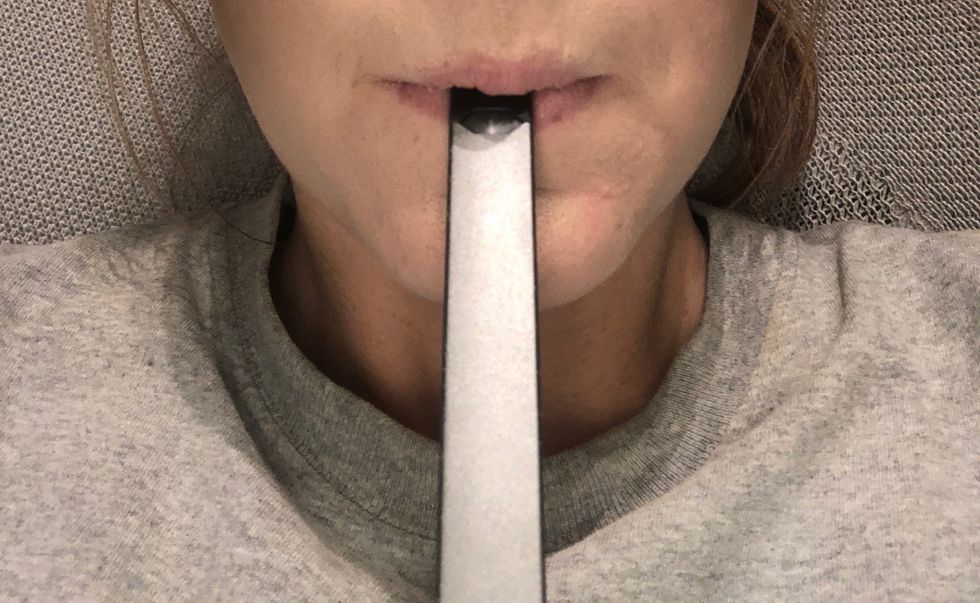One of my close friends finally rid herself from her handy sidekick which inspired me to do a little research and get up-to-date on the current fad: Juuls. This popular e-cigarette brand claims that it is a "smoking alternative," but I have noticed that it is causing quite the opposite effect.
Juuling is very popular among young teens to college students and millennials are going insane over the hype. We see them in class, on the streets, at the bar scene, and all over social media. It has almost become more uncommon to not have one.
My parents speak of a time where almost everybody smoked (cigarettes) and no one knew it was bad for you. To me, the Juul culture mirrors the same kind of thing.
Since they have only been on the market for a couple of years now, doctors and researchers are unable to determine all the health risks associated with the product and what all it may lead to. Although many know it is still unhealthy to vape, I get the impression that we don't know nearly anything about the full extent of how bad it actually is for you- yet.
I was shocked to find out that they have a much higher nicotine content level than many other e-cigarettes. It is also appalling that a single pod is equivalent to an entire pack of cigarettes. So many people are unknowingly inhaling much more than they realize. I have repeatedly seen this little device turn previous non-smokers into complete nicotine addicts.
I have never been one to follow trends such as these, and thank goodness for that.
Juuls are appealing because of their discrete flash drive-looking appearance, the range of flavors like mango or mint, and a reduced amount of sweet-smelling smoke exhale. While talking to friends that do participate in this new societal norm, almost all experience frequent side effects of coughing, wheezing, and burning. Many that do try to quit, however, go through intense and painful withdrawal symptoms.
My best friend recently reached out to me, stressed and in tears, from seeing what happened to her boyfriend. Doctors claim he suffered a "nicotine overdose" from hitting his Juul too often. This resulted in a traumatic experience, plus hours on end at the hospital. The side effects he faced were so bad, he refuses to ever even look at it again. Now, he worries about possibly facing lung cancer.
We hear about this news topic constantly and see a plethora of media warning parents and teachers about the harmful effects of Juuls. They have even been banned at several institutions. Nevertheless, I find it interesting that no one seems to be discussing the other apparent worry for this age group: oral fixations. The strong desire for constant oral stimulation all starts from a young age and can manifest itself into adulthood.
I remember back in grade school if you had gum you were suddenly the most popular kid in class. Whether it's chewing gum, constantly applying chapstick, sucking on mints, binge eating, over drinking, kissing, smoking, vaping, biting your nails, etc… these fixations can be a cause for concern among the entire human population.
We start to call them "bad habits" or refer to them as "mannerisms," but are they really? These behaviors of mouth obsession are likely contributing to addiction and a need among individuals for dark pleasures. Many are currently stuck with the unknown burden of continuously seeking to fill a void they have constructed upon themselves. This goes hand-and-hand with thoughts of human nature never being truly satisfied and always wanting more.
Witnessing this consciousness among myself and others has shown me significant impacts on individuals. I have noticed that these flaws are burdening us by taking over the daily habits of our lives, causing problems that go even beyond that. Everyone I know has some form of bad habit or addiction they have yet to shake, usually involving mouth penetration. Problems concerning a high number of nicotine addicts, all starts with an oral fixation.
The craving for these subconscious activities are being unsuccessfully treated through things such as Juuling and it needs to be stopped. There needs to be a more efficient and appealing way to prevent these habits within our society, especially for the sake and overall well-being of the youth. Maybe researchers and psychologists will monitor this behavior at the developmental stage to soon come up with a better solution.

















